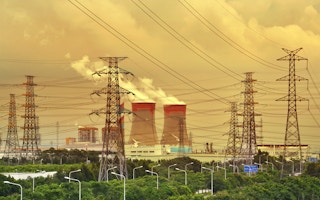The leader of China’s climate negotiating team at the talks, Su Wei, says he is “not sure whether we are able to make much progress.”
Having said he should “keep silent for a while” over Japan’s reduction in its efforts to cut its emissions of carbon dioxide, Su said: “I don’t know how to describe the meetings and negotiations here in Warsaw.” But he said the European Union’s targets for reducing greenhouse gas emissions were “not at all ambitious”.
Nor did he accept any responsibility for events which many believe are connected to climate change. Asked what linked Typhoon Haiyan and China’s growing carbon emissions, he said historic and accumulated carbon concentrations in the atmosphere should be blamed for the disaster.
Though China is one of the world’s biggest carbon emitters, he said: “We are below or around the world’s average in terms of emissions per capita and historical accumulations.
“In spite of this, we have made great efforts to transform our development patterns and decrease the carbon intensity of our economic output.”
Finance crucial
Speaking at a media briefing here, Su also urged the developed countries to come up with a specific timetable and roadmap to deliver on their promises of finance and technology for poorer countries.
He said it was not clear whether the developed countries had implemented their plan to give US$10 bn to poorer countries annually from 2010 to 2012. Nor was it known how they would fulfill their promise to give $100 billion from 2013 to 2020, while they were gradually emerging from the economic downturn.
“We are almost at the end of 2013 and so it is urgent to have actual provisions of resources confirmed and to achieve the finance goal by developed countries by 2020,” said Su.
This week government ministers are gathering in Warsaw in an effort to raise the political will to solve the human challenge of climate change.
High hopes
Su said China and other developing countries had come to Warsaw with expectations, hoping progress to enhance efforts to address the threat could be made.
“We saw the Warsaw conference as an important occasion for all the parties to implement the decisions made from the Bali talks in 2007 to Doha last year,” said Su.
But one of the key issues of implementing that consensus was financial transfers from the developed countries, which had used much of the carbon budget during their process of urbanisation and industrialisation.
“At the core of implementation in Warsaw is finance, and we hope we can make progress on that,” said Su. “That is a very important starting point, and also is key to the successful conclusions of post-2020 climate talks.”
Su Wei said China had been implementing programmes for reducing carbon intensity, with the target of cutting it by 40-45% by 2015 on 2005 levels. “China is very committed to delivering its promises agreed by previous UN climate change negotiations,” said Su.










